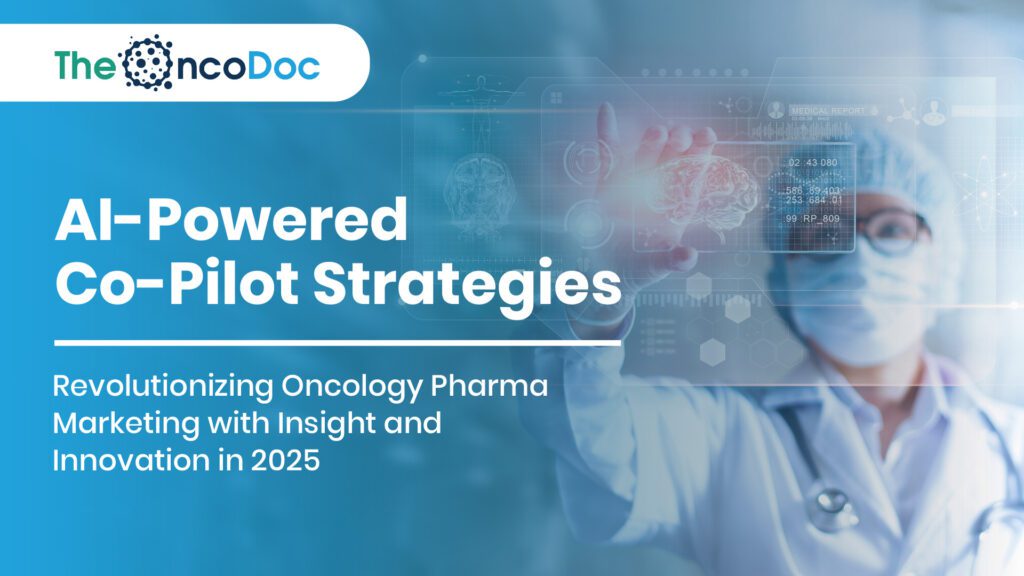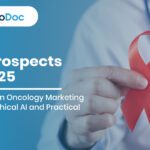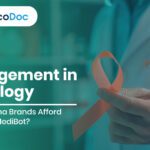Introduction: A New Era of Pharma Marketing Powered by AI
The marketing of pharmaceuticals for oncology is changing significantly in 2025. Artificial Intelligence (AI) is no longer just a tool, it is becoming a co-pilot, enabling marketers to transcend operational challenges, streamline regulatory workflows, and deliver hyper-personalized campaigns. This evolution is not about replacing human expertise but about amplifying creativity, empathy, and strategic vision.
The oncology space is complex and emotionally charged. Healthcare professionals (HCPs) expect reliable information, patients desire clarity and hope, and pharmaceutical companies must adhere to strict compliance regulations. AI co-pilots empower marketing teams to focus on human-centric storytelling and strategic innovation, while algorithms manage compliance, analyze vast datasets, and automate tedious processes.
This article explores how the co-pilot model is reshaping oncology pharma marketing, outlining key strategies, data-driven insights, and forward-looking innovations that are redefining patient engagement and healthcare communication in a highly regulated field.
1. AI Co-Pilot in Compliance: Revolutionizing MLR Review
In pharmaceutical marketing, the Medical, Legal, and Regulatory (MLR) approval process frequently acts as a bottleneck, reducing agility and postponing campaigns. AI is solving this challenge:
- Automated Pre-Screening: AI systems pre-screen content for compliance against FDA, EMA, and EFPIA regulations, internal brand guidelines, and approved claims libraries, reducing repetitive manual checks.
- Error Detection & Streamlining: AI identifies high-risk claims or missing disclaimers, enabling human reviewers to focus only on nuanced approvals.
- Explainability & Traceability: Advanced AI doesn’t just flag issues; it provides citations from exact regulations, improving transparency and creating an auditable workflow.
- Efficiency Impact: AI-driven compliance workflows are cutting review time by up to 40%, helping oncology brands launch faster, evidence-based campaigns.
This shift establishes AI as a trusted regulatory co-pilot, ensuring speed without compromising accuracy, a necessity in oncology, where timely awareness can save lives.
2. Regionalized and Localized Oncology Marketing
Oncology is deeply local. Cancer prevalence, cultural stigma, and patient behaviors differ dramatically by region. AI co-pilots empower marketers to generate hyper-localized campaigns at scale:
- Multilingual Content Generation: AI tools translate and adapt campaigns into vernacular languages, ensuring accessibility and trust.
- Cultural Sensitivity: Algorithms factor in cultural beliefs that may influence health-seeking behavior. For instance, taboo-sensitive language is frequently needed in Asian prostate cancer awareness programs to promote screening.
- Visual Adaptation: AI dynamically selects regionally appropriate imagery to reflect diverse patient demographics, improving relatability.
- Scalable Rollout: Marketers can now deploy hundreds of localized campaigns simultaneously, maintaining a global brand identity while addressing local needs.
3. Personalization for HCP Engagement
AI-driven personalization is enabling pharma reps to deliver targeted, context-rich engagement for oncologists and specialists:
- Behavioral Mapping: AI tracks HCP preferences, such as preferred journal subscriptions, conference attendance, and past digital engagement.
- Tailored Resources: A busy oncologist may receive a 60-second MOA (Mechanism of Action) animation, while a researcher might get a detailed slide deck with Phase III trial data.
- Predictive Sales Enablement: AI platforms alert reps about upcoming opportunities, such as new drug approvals or local guideline changes, enabling proactive discussions.

4. AI in Real-Time Market Intelligence
In 2025, waiting for quarterly or annual reports is obsolete. AI co-pilots offer instant market pulse analysis:
- Social Media & Forum Insights: AI continuously monitors oncology-related conversations to identify emerging patient concerns or misinformation trends.
- Competitor Activity Tracking: Machine learning algorithms flag competitor campaigns, pricing strategies, or drug launches, offering real-time intelligence.
- Rapid Campaign Adjustments: Marketing teams can adjust messaging or promotions within days, not months, based on live insights.
This predictive intelligence ecosystem helps pharma brands remain agile in a rapidly evolving oncology landscape.
5. Mapping Patient Journeys with AI
Understanding the oncology patient journey is critical to delivering empathetic, supportive campaigns:
- Data Integration: AI integrates EHRs, wearable data, social media insights, and support group discussions to map patient pain points.
- Micro-Moment Identification: AI pinpoints emotional “tipping points,” such as diagnosis shock, first chemotherapy cycle, or remission milestones, to provide contextual messaging.
- Outcome-Oriented Marketing: Campaigns now focus on improving patient quality of life rather than mere brand promotion.

6. AI-Driven Predictive Campaigning
Predictive AI systems identify future cancer screening needs and awareness gaps:
- Search Pattern Forecasting: AI flags surges in searches for symptoms like “chronic cough” or “painless lumps,” helping pharma teams deploy hyperlocal educational content.
- Geo-Specific Alerts: If a city sees rising searches for lung cancer symptoms, AI prompts community-level campaigns to encourage early checkups.
- HCP Training Triggers: Localized training modules are sent to GPs in high-risk areas.
7. Automating Content Creation at Scale
Content production in oncology is notoriously complex, requiring scientific accuracy, emotional nuance, and multilingual reach. AI co-pilots simplify:
- Dynamic Campaign Creation: Marketers can auto-generate patient brochures, awareness videos, and trial summaries, with built-in compliance checks.
- Micro-Content for Social Media: AI optimizes short-form content (e.g., Instagram Reels, LinkedIn snippets) to reach younger caregivers and health-conscious demographics.
- Medical Writing Assistance: AI drafts trial summaries and abstracts, helping teams speed publication timelines while maintaining rigor.
8. Data-Driven Budget Optimization
In an era of tighter budgets, AI ensures every marketing dollar delivers measurable impact:
- Channel Performance Forecasting: AI predicts ROI for email campaigns, in-person CME events, and social advertising.
- Dynamic Resource Allocation: Budgets shift in real time to channels delivering higher engagement per dollar.
- Outcome Tracking: AI links campaign spend to patient outcomes like screening rates or survivorship program participation.

9. Emotional Storytelling as a Human Strength
AI may optimize delivery, but human creativity remains irreplaceable:
- Campaigns built around patient survivors’ stories humanize oncology, inspiring early diagnosis.
- AI assists by identifying emotional resonance metrics, showing which narratives drive hope and trust.
- Pharma brands increasingly invest in content creators, medical writers, and survivor ambassadors who craft empathetic messaging.
10. Integrating AR/VR with AI Co-Pilot Systems
Immersive technologies are now supercharged with AI analytics:
- Virtual Oncology Simulations: VR modules help patients visualize therapy impact, reducing anxiety.
- AI Personalization: Content is adjusted in real-time based on a patient’s responses, medical history, or anxiety levels.
- Training for Oncologists: AR-powered surgical simulations integrate real-world cancer data to prepare for complex procedures.
11. AI-Enhanced Patient Support Chatbots
AI-powered chatbots are the frontline interface between pharma and patients:
- Multi-Language Support: Bots answer FAQs in local languages, bridging literacy gaps.
- Symptom Navigation: Chatbots suggest possible next steps based on patient input while emphasizing physician consultation.
- Emotional Check-ins: AI sentiment detection triggers live human intervention if patients express distress.
12. Addressing Global Oncology Health Equity
AI co-pilots are pivotal in bridging access gaps:
- Equity Mapping: AI identifies underserved regions lacking screening infrastructure.
- Subsidized Awareness Drives: Pharma brands partner with NGOs to run targeted interventions in rural or low-income areas.
- Affordable Digital Health Tools: AI simplifies content creation for awareness drives, lowering operational costs and making outreach scalable.
13. The Co-Pilot Model: Collaboration Over Replacement
AI is not replacing pharma marketers; it is freeing them to focus on higher-value tasks:
- AI Handles: Data entry, compliance scans, segmentation, predictive insights.
- Humans Focus On: Strategy, brand-building, empathy-driven campaigns, and innovation.
- Strategic Leadership: Marketers now guide AI models, training them to better reflect brand voice and ethics.
14. Ethical AI in Oncology Marketing
Ethics is critical in this highly regulated field:
- Bias Reduction: AI models undergo regular audits to eliminate gender, ethnic, and socioeconomic bias.
- Transparent AI Decisions: Every AI-generated recommendation is auditable for regulatory approval.
- Privacy Preservation: Patient data anonymization and GDPR compliance ensure ethical digital marketing practices.
15. Future Outlook: AI as a True Partner
In the coming years, oncology marketing will evolve toward:
- Digital Twin Technology: Simulated patient avatars to test treatment communication strategies.
- Proactive Health Interventions: Campaigns that predict and prevent disease progression.
- Seamless AI-Human Collaboration: Co-pilot systems that work as trusted colleagues, allowing marketers to operate as visionary leaders.
16. AI-Powered Clinical Trial Recruitment Support
Oncology clinical trials are notoriously difficult to recruit for, often causing delays in treatment innovation. AI co-pilots are solving this challenge by identifying eligible patients more efficiently:
- Data Mining Across Systems: AI integrates EMR (Electronic Medical Records), genetic profiles, and insurance databases to pinpoint ideal trial candidates.
- Personalized Outreach: Patients receive personalized invitations and educational materials about trial opportunities, improving trust and participation.
- HCP Alerts: Oncologists are notified when eligible patients in their practice match trial criteria, making it easier to suggest enrollment.
- Impact: Pharma companies report 30–40% reductions in recruitment timelines with AI-assisted targeting.
This approach is democratizing access to cutting-edge treatments while accelerating drug development pipelines, ultimately improving survival rates for cancer patients worldwide.
17. AI for Patient Sentiment and Emotion Mapping
Emotional intelligence is critical in oncology marketing, and AI is now capable of performing sentiment and emotion mapping at scale:
- Advanced NLP Algorithms: AI analyzes text, audio, and even video from social forums, patient calls, and chatbot interactions to detect fear, anxiety, or optimism.
- Customized Campaign Messaging: Campaigns can be adjusted dynamically. For instance, marketers highlight support services and success stories if sentiment analysis reveals that a region is afraid of chemotherapy.
- HCP Training Support: Doctors receive AI insights to help them address emotional barriers during consultations.
- Market Insight: Emotion mapping offers early signals of patient dissatisfaction, helping pharma brands improve both messaging and services.
This deep emotional understanding ensures marketing campaigns are empathetic, culturally sensitive, and trust-building.
18. AI-Driven Health Literacy Enhancement
Cancer awareness campaigns often fail when audiences have low health literacy. AI co-pilots address this by tailoring educational content for every literacy level:
- Simplified Medical Narratives: AI rewrites complex oncology terms into patient-friendly language without losing scientific accuracy.
- Voice-First Education: For regions with low literacy, AI generates audio content in local dialects for IVR systems and podcasts.
- Gamified Learning Modules: AI creates interactive learning modules for caregivers and patients, helping them understand treatments better.
- Impact: Regions deploying AI-driven literacy programs report 25% higher engagement rates in early cancer screening campaigns.
This ensures oncology campaigns reach not just tech-savvy audiences but also marginalized, rural populations.
19. Precision Marketing with Genomics Integration
Marketing is changing as oncology becomes more genomics-driven:
- Personalized Messaging: AI integrates genomic insights to tailor awareness campaigns for at-risk individuals.
- Targeted Prevention: Families with hereditary cancer risk factors receive hyper-personalized prevention programs and education materials.
- Healthcare Collaboration: Pharma marketers work alongside oncologists and genetic counselors to ensure messaging is medically accurate and non-alarming.
- Future Potential: With the cost of genome sequencing dropping, AI-powered genomics marketing will soon become standard for targeted therapy campaigns.
This is a leap toward precision marketing that mirrors precision medicine.
20. Sustainable and Ethical AI Marketing Practices
As AI marketing scales, sustainability and ethics are becoming core focus areas:
- Eco-Friendly Campaigns: AI helps marketers identify digital-first strategies, reducing print campaigns and minimizing carbon footprint.
- Data Ethics: Transparent consent frameworks ensure patients understand how anonymized data is used.
- Green Tech in Pharma: AI optimizes supply chain logistics, reducing waste from excess materials for marketing events and promotional campaigns.
- Brand Impact: Ethical and eco-conscious approaches increase trust, especially among younger, socially aware patients and caregivers.
Sustainability-driven AI strategies strengthen pharma’s role as a responsible healthcare partner while achieving marketing efficiency.
Conclusion: The Future of Oncology Pharma Marketing is Human-AI Symbiosis
AI as a co-pilot is not just a technological evolution; it is a cultural shift in oncology pharma marketing. This model redefines workflows, reduces operational inefficiencies, and enables personalized campaigns at scale. Yet, the heart of oncology marketing, human empathy, trust-building, and creative storytelling, remains irreplaceable.
The co-pilot model demonstrates that AI does the heavy lifting, giving marketers space to focus on vision, creativity, and patient advocacy. From hyperlocal campaigns and sentiment mapping to genomics-powered messaging and clinical trial acceleration, AI is shaping oncology marketing into a predictive, precise, and people-first ecosystem.
In the next decade, this partnership between AI and humans will revolutionize how cancer patients receive education and support, leading to earlier detection, improved adherence, and stronger patient outcomes. Pharma brands that embrace this co-pilot paradigm are poised to set industry benchmarks for both innovation and compassion.
The Oncodoc team is a group of passionate healthcare and marketing professionals dedicated to delivering accurate, engaging, and impactful content. With expertise across medical research, digital strategy, and clinical communication, the team focuses on empowering healthcare professionals and patients alike. Through evidence-based insights and innovative storytelling, Hidoc aims to bridge the gap between medicine and digital engagement, promoting wellness and informed decision-making.



